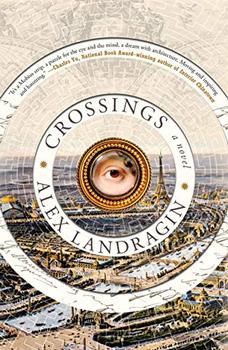Summary | Excerpt | Reading Guide | Reviews | Beyond the Book | Readalikes | Genres & Themes | Author Bio

Finally, as I smoked a cigar, Giacomo announced the arrival of Madame Édmonde. He opened the doors at the end of the room and the slender shape of a young woman wearing a sumptuous black dress appeared. Pinned to the crown of thick braids that adorned her head was a veil of dark tulle that masked her face. I tried to stand but a shot of pain in my ankle cut my gallantry short. She approached the table hesitantly, almost shyly. There was a subtle, feline grace about her movements, set to the rustle of the velvet of her dress. She approached until she stood directly before me. "Please, monsieur, remain seated," she said. Her voice was hushed, as if coming from a much greater distance than where she stood. "I am given to understand you are pained, and at any rate, I do not stand for excessive formality."
Giacomo helped her into the seat at the opposite end of the table. She asked if I had eaten my fill; I assured her I had, and thanked her for her hospitality. My clothes, she said, were being laundered. I asked after my fob watch. "It was shattered," she replied. "It has been sent to a watchmaker to be repaired."
"If you will pardon my forwardness, madame," I began, "I am brimming with curiosity. Who are you?"
"My name is Madame Édmonde de Bressy."
"De Bressy … Your name is unfamiliar to me."
"That is of no consequence."
"Why are you lavishing such generosity upon a complete stranger?"
"You are not a complete stranger."
"Do we know each other?"
"In a manner of speaking."
"I do not recall having ever met a Madame Édmonde, or even a Mademoiselle Édmonde."
"That does not alter the fact that we have had occasion to know each other, in a distant past."
"Perhaps," I said, "if you reveal your face I will remember."
"I assure you it will make no difference at all," she replied, but all the same she raised her hands to her veil and lifted it, pulling it back over her head, revealing a face that was hideously disfigured, closer in resemblance to the face of a monster encountered in a dream than that of a man or woman. Among the living, the only faces I have seen that could compare are in the daguerreotypes that were fashionable in Paris years ago, and which can still be found from time to time in the stalls of the riverside bouquinistes, depicting the deformed countenances of certain unfortunates residing in the Salpêtrière hospital. It was as if some demon had pulled her eyes down toward the floor and simultaneously lifted the nose upward and to the right. Her mouth was diagonally distended. The skin of her face appeared to have been ravaged by flames in its lower part, and her chin was inverted. As it was already nearing dusk, she was illuminated by candlelight, and its shadows accentuated the unnatural walnutty crevices of her face.
I knew not what to say, and a silence as thick as snow descended upon us. It was Madame Édmonde who broke it. "You may take every advantage of my hospitality for as long as you wish," she said, lowering her veil. "You are not a prisoner here. You may come and go. You are welcome to stay as long as you like, to leave whenever you like—now, tomorrow, or next week. When you decide to leave, you will be provided with a carriage and driven to your hotel." Your hotel, I noted, without interrupting her. She knew far more of me than I of her. "If you choose to stay," she continued, "I will unveil every mystery about myself that you wish. But if you should choose to return to your lodgings tonight, I have only one thing to say to you."
"And what is that, pray tell?"
She sat in perfect stillness. Somehow I felt her eyes fixed on me, even though they were hidden behind her veil. "Monsieur, listen carefully to what I have to tell you. All the stories Jeanne Duval told you are true—every last one. They were not fantasies. They were not hallucinations. They were not inventions, fabrications, or lies. She was no lunatic, hysteric, or Scheherazade. She was not a ghost or a ghoul. She was a teller of the truth. And you would do well to heed it." With the utmost grace and dignity, Madame Édmonde stood and, bidding me a good night, walked off toward the doorway.
Excerpted from Crossings by Alex Landragin. Copyright © 2020 by Alex Landragin. Excerpted by permission of St. Martin's Press. All rights reserved. No part of this excerpt may be reproduced or reprinted without permission in writing from the publisher.




Music is the pleasure the human mind experiences from counting without being aware that it is counting
Click Here to find out who said this, as well as discovering other famous literary quotes!
Your guide toexceptional books
BookBrowse seeks out and recommends the best in contemporary fiction and nonfiction—books that not only engage and entertain but also deepen our understanding of ourselves and the world around us.